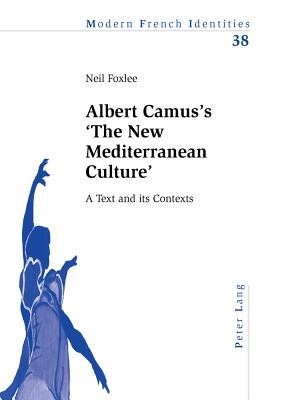
- We will send in 10–14 business days.
- Author: Neil Foxlee
- Publisher: Peter Lang UK
- ISBN-10: 303430207X
- ISBN-13: 9783034302074
- Format: 15.2 x 22.9 x 1.9 cm, minkšti viršeliai
- Language: English
- SAVE -10% with code: EXTRA
Albert Camus's 'The New Mediterranean Culture'; A Text and its Contexts (e-book) (used book) | bookbook.eu
Reviews
Description
This book was shortlisted for the R.H. Gapper prize 2011.On 8 February 1937 the 23-year-old Albert Camus gave an inaugural lecture for a new Maison de la culture, or community arts centre, in Algiers. Entitled 'La nouvelle culture méditerranéenne' ('The New Mediterranean Culture'), Camus's lecture has been interpreted in radically different ways: while some critics have dismissed it as an incoherent piece of juvenilia, others see it as key to understanding his future development as a thinker, whether as the first expression of his so-called 'Mediterranean humanism' or as an early indication of what is seen as his essentially colonial mentality.
These various interpretations are based on reading the text of 'The New Mediterranean Culture' in a single context, whether that of Camus's life and work as a whole, of French discourses on the Mediterranean or of colonial Algeria (and French discourses on that country). By contrast, this study argues that Camus's lecture - and in principle any historical text - needs to be seen in a multiplicity of contexts, discursive and otherwise, if readers are to understand properly what its author was doing in writing it. Using Camus's lecture as a case study, the book provides a detailed theoretical and practical justification of this 'multi-contextualist' approach.
EXTRA 10 % discount with code: EXTRA
The promotion ends in 22d.20:19:31
The discount code is valid when purchasing from 10 €. Discounts do not stack.
- Author: Neil Foxlee
- Publisher: Peter Lang UK
- ISBN-10: 303430207X
- ISBN-13: 9783034302074
- Format: 15.2 x 22.9 x 1.9 cm, minkšti viršeliai
- Language: English English
On 8 February 1937 the 23-year-old Albert Camus gave an inaugural lecture for a new Maison de la culture, or community arts centre, in Algiers. Entitled 'La nouvelle culture méditerranéenne' ('The New Mediterranean Culture'), Camus's lecture has been interpreted in radically different ways: while some critics have dismissed it as an incoherent piece of juvenilia, others see it as key to understanding his future development as a thinker, whether as the first expression of his so-called 'Mediterranean humanism' or as an early indication of what is seen as his essentially colonial mentality.
These various interpretations are based on reading the text of 'The New Mediterranean Culture' in a single context, whether that of Camus's life and work as a whole, of French discourses on the Mediterranean or of colonial Algeria (and French discourses on that country). By contrast, this study argues that Camus's lecture - and in principle any historical text - needs to be seen in a multiplicity of contexts, discursive and otherwise, if readers are to understand properly what its author was doing in writing it. Using Camus's lecture as a case study, the book provides a detailed theoretical and practical justification of this 'multi-contextualist' approach.


Reviews